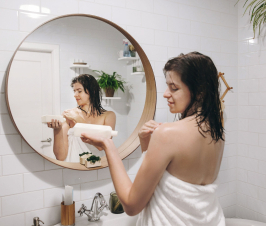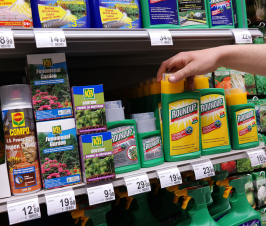I’ve written about the Environmental Working Group(EWG) before. A wonderful organization which strives to inform the public about toxic exposure in products and the environment, and lobby on our behalf. Their “Skin Deep” database looks at a plethora of various personal care products and rates them on their toxicity and danger to both the person and environment. Currently working with U.S. manufacturers to remove 1,4-dioxane from products.
1,4-Dioxane: Possible Human Carcinogen
1,4-dioxane is a likely human carcinogen, which is often a byproducts of other chemicals used in cosmetic products – namely associated with ethoxylated ingredients, or polyethylene glycols (PEGs). PEGs are used as thickeners, solvents, softeners and moisture carriers, and are petroleum-based chemical compounds. The manufacturing process runs the risk of contaminating PEGs with 1,4-dioxane, and other contaminants, including ethylene oxide. The International Agency for Research on Cancer (IARC) classifies 1,4-dioxane as a possible human carcinogen. Ethylene oxide is actually classified as a knownhuman carcinogen.
Senators Charles Schumer and Kirsten Gillibrand of New York recently petitioned the FDA to ban 1,4-dioxane from personal care products. EWG is following up by sending 500 surveys to various makers of body washes, hand soaps, shampoos and lotions. Many of these manufacturers may actually not be aware that this potentially dangerous byproduct is being included in their end product.
Unregulated Personal Care Products Rely on Consumer Vigilance
Because personal care products are largely unregulated, much of the safety considerations fall on the shoulders of the consumer. It certainly isn’t ideal, and reform is long overdue, however the EWG and other watchdog organizations provide a very important service in education and lobbying power for the general public. They have an easy to use app which allows consumers to browse hundreds of products, all analyzed for toxicity. They also have a robust reporting venue on their website: ewg.org.
 Node Smith, associate editor for NDNR, is a fifth year naturopathic medical student at NUNM, where he has been instrumental in maintaining a firm connection to the philosophy and heritage of naturopathic medicine amongst the next generation of docs. He helped found the first multi-generational experiential retreat, which brings elders, alumni, and students together for a weekend campout where naturopathic medicine and medical philosophy are experienced in nature. Three years ago he helped found the non-profit, Association for Naturopathic ReVitalization (ANR), for which he serves as the board chairman. ANR has a mission to inspire health practitioners to embody the naturopathic principles through experiential education. Node also has a firm belief that the next era of naturopathic medicine will see a resurgence of in-patient facilities which use fasting, earthing, hydrotherapy and homeopathy to bring people back from chronic diseases of modern living; he is involved in numerous conversations and projects to bring about this vision.
Node Smith, associate editor for NDNR, is a fifth year naturopathic medical student at NUNM, where he has been instrumental in maintaining a firm connection to the philosophy and heritage of naturopathic medicine amongst the next generation of docs. He helped found the first multi-generational experiential retreat, which brings elders, alumni, and students together for a weekend campout where naturopathic medicine and medical philosophy are experienced in nature. Three years ago he helped found the non-profit, Association for Naturopathic ReVitalization (ANR), for which he serves as the board chairman. ANR has a mission to inspire health practitioners to embody the naturopathic principles through experiential education. Node also has a firm belief that the next era of naturopathic medicine will see a resurgence of in-patient facilities which use fasting, earthing, hydrotherapy and homeopathy to bring people back from chronic diseases of modern living; he is involved in numerous conversations and projects to bring about this vision.

















